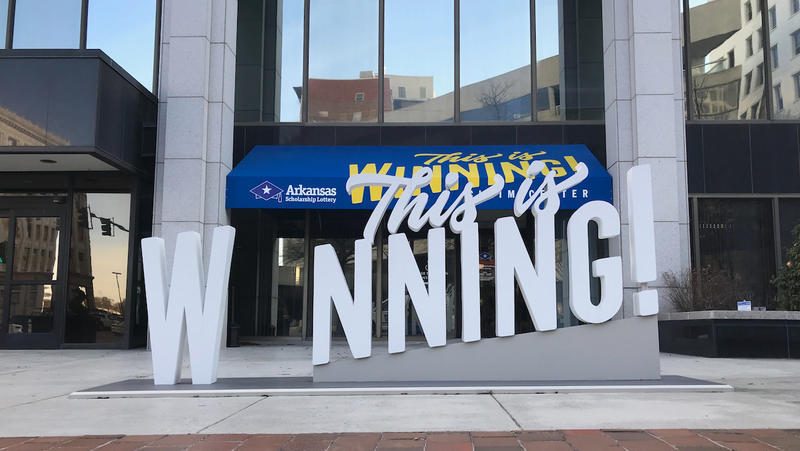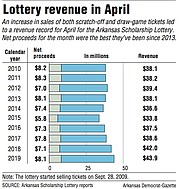Arkansas Scholarship Lottery's total revenue and the amount raised for scholarships increased in April over year-ago figures as the lottery's scratch-off and draw game revenue inched up.
The lottery's revenue reached $43.9 million last month -- up from $42 million a year ago, which represented the previous record for April -- the lottery reported this week in its monthly report to Gov. Asa Hutchinson and the Legislative Council's lottery oversight subcommittee.
The amount raised in April for scholarships was $8.1 million, compared with $7.1 million a year ago, the lottery reported. The record for the month is $8.3 million in 2011.
The lottery started selling tickets on Sept. 28, 2009 -- almost 10 years ago. The 2009 Legislature enacted a law creating the lottery, following voter approval of Amendment 87 in November 2008.
Former Lt. Gov. Bill Halter, who led the campaign to create the lottery, and former lottery Director Ernie Passailaigue initially projected the program would raise $100 million a year for college scholarships -- a mark that the lottery hasn't reached yet. The lottery has helped fund more than 30,000 Arkansas Academic Challenge Scholarships during each of the past nine fiscal years.
In April, scratch-off ticket revenue increased by $1.2 million over the same month a year ago to $37.3 million, while draw game revenue increased by nearly $700,000 to $6.6 million, the lottery reported.
"Our group of April instant tickets, retail execution and our advertising, coupled with our early launch, were the biggest reasons why our instant sales were up $1,216,142," lottery Director Bishop Woosley said in a written statement. Scratch-off tickets also are called instant tickets.
"All three of our jackpot games grew over the course of the month [and] as a result, we were up in draw game sales $679,846," he said.
Draw games include the Powerball and Mega Millions jackpot games as well as Natural State Jackpot, Cash 3 and Cash 4, Fast Play and Lucky for Life.
These increased sales meant the lottery raised more for scholarships last month, Woosley said.
"In addition, we continue to operate as lean as possible to ensure that the most money goes back to scholarships as possible," he said. The lottery reported 65 employees at the end of April compared to 68 a year ago.
The lottery's sales director post is vacant. The previous sales director, Mitch Chandler, left to become director of executive communications at the Arkansas Economic Development Commission on Dec. 31. At that time, Woosley said lottery officials were going to study possible changes to its 22-employee sales division.
But Woosley said Friday that "no changes have been made to the sales division."
Asked if the sales director post has been filled or eliminated, he said, "We do not currently have a sales director. The position still exists."
Asked if he has searched for a sales director, he replied, "Not as of yet."
Retailers selling tickets totaled 1,921 as of April 30, down from 1,930 a year ago, the lottery reported.
FISCAL 2019
In fiscal 2019 thus far -- April is the 10th month -- revenue totaled $436.6 million, an increase of $14.3 million over what was collected in the same period in fiscal 2018. The total also is $32 million more than what was projected.
Scratch-off revenue increased to $343.6 million, compared to $341.7 million in the same period in fiscal 2018, while draw-game revenue increased to $92.3 million from $79.8 million.
Net proceeds -- the amount raised for college scholarships -- totaled $76.5 million in the period, compared with $70.5 million raised in the same period last fiscal year.
At the end of the fiscal year, unclaimed prizes, minus a $1 million balance, are transferred to scholarships.
The unclaimed prize reserve fund totaled $6.9 million as of April 30. The lottery had $658,625 in unclaimed prizes last month.
Net proceeds of $76.5 million, plus the money from the unclaimed prize fund, means the lottery has raised $82.5 million for scholarships so far this fiscal year, and that's more than $11 million over the projected budget, Woosley said.
"From a sales and proceeds standpoint, we have never been in a better position at this time in a fiscal year," Woosley said. "If this trend holds, we may surpass our previous record for sales and proceeds."
Woosley last year projected fiscal 2019 revenue at $482.9 million and net proceeds of $85.9 million.
In fiscal 2018, which ended June 30, the lottery collected a record $500.4 million in revenue. The lottery also raised $91.9 million for college scholarships -- the third-largest amount in a fiscal year.
The record amount of net proceeds was $97.5 million in fiscal 2012, after it raised $94.2 million the year before. These are the only fiscal years in which net proceeds exceeded $90 million.
In fiscal 2020 that starts July 1, the lottery projects revenue of $497 million and net proceeds of $89.3 million, Woosley said.
The total value of Arkansas Academic Challenge Scholarships awarded peaked in fiscal 2013 at $132.9 million, according to the Arkansas Department of Higher Education. The department has projected paying out $92.4 million in scholarships for 34,200 students in fiscal 2019.
Years ago, the Legislature cut the size of future scholarships for some recipients three times due to declining net proceeds at the time.
With the lottery's rebound in recent years, the Legislature in 2017 created a new scholarship program called the Arkansas Workforce Challenge Scholarship program to be financed with excess proceeds. The program started last fall to help students enrolled in higher education programs leading them to being qualified to work in high-demand occupations.
OVERSIGHT
Sen. Joyce Elliott, D-Little Rock, who is now a co-chairman of the lottery oversight subcommittee, said Friday that she hadn't had a chance to review the lottery's report for April yet.
"The first thing we are going to do when we meet is we have several new people on that committee and so much of the language is pretty esoteric and just common to [the lottery and the committee will] ... have a little tutorial about what are the kind of reports we are going to be getting [and] what do they mean," she said.
"We are going to ask Bishop to also give us a tutorial on how the lottery works, what is the difference between this game and that game and what matters and do a tutorial on the Camelot [consulting] contract because there will be many people in there who never even heard of the Camelot contract," Elliott said, referring to the lottery consultant with offices in Philadelphia and London.
She said the Legislature in 2015 changed the challenge scholarship eligibility for high school graduates from requiring either at least an ACT score of 19 or a 2.5 grade-point average to requiring just an ACT score of at least 19, and she wants to study going back to the previous criteria.
"As part of that, we will be looking at the economic stability" of the lottery, Elliott said.
Metro on 05/11/2019


